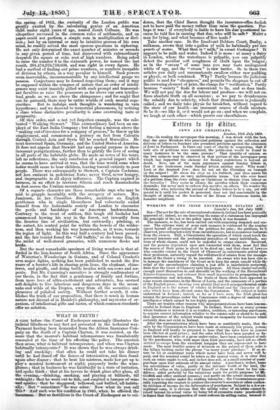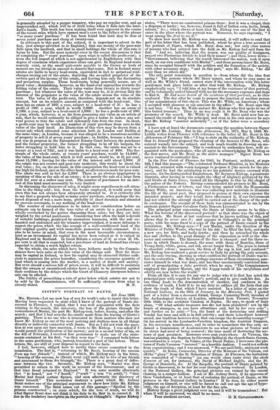WORKING OF THE IRISH ENCUMBERED ESTATES ACT.
Lincoln's Inn, 8th July 1850.
Ste—The act for the sale of encumbered estates in Ireland has been generally approved of; indeed, no one deserving the name of a statesman has impugned the principle of the act or the policy upon which it was founded.
The measure, so far, has been carried outwith surprising despatch and suc- cess. The extreme want of some such measure is evidenced by the number (great beyond all expectation) of the petitions for sales ; the petitions, be it observed, proceedingnot solely from encumbrancers, but in numerous instances from the owners. Still, a Commission the operation of which must touch the personal interests and the professional prejudices of many individuals, nay even of whole classes, could not be expected to mope °ensure. Receivers, and the persons dependent upon and connected with them, mud feel that the source of their gains is about to be dried up; and that clam of lawyers who consider estates in the Court of Chancery as endowments settled upon their profession, naturally regard the withdrawal of estates from the manage- ment of the Court a wrong to be resented. An owner who has been able so to manage the machinery of the Court as to keep his estate unsold while the relief of the encumbrancer claiming a just debt is indefinitely postponed, finds that the Court of Chancery suits his purpose. All these classes naturally enough exert themselves to east discredit on the working of the Encumbered Estates Commission, and exhaust their small ingenuities in propagating mis- representations and delusions. The fruits of these efforts have appeared * some recent discussions in the Rouse of Lords, and the comments of a portion of the English press ; showing very plainly that much misapprehension exists in England as to the nature of estates in Ireland and the character of the sales which have been effected under the Commission. The subject is better understood in Ireland ; indeed, as far as I have seen, the Irish press has treated the proceedings under the Commission with a degree of candour and intelligence which cannot be too highly praised. There are besides other reasons why misrepresentations have been less suc- cessful in Ireland than in England. In Ireland, there are so many persons whose business or interest it is as vendors, creditors, or intending -purchasers, to acquire correct information relative to the estates sold or about to be sold, that ignorance of the subject weld argue an incapacity for business whir& certainly does not exist in Ireland. After the representations which have been so confidently made, that the sales by the Commissioners have been made at ruinously low prices, persons in England will hardly be prepared to hear that the sales hare in geneml been effected at good prices;. and the sales which bare been paraded as fla- grant instances of sales at a gross under-value, have been complained of only by the purchasers, who, with more than Irish perversity, have left no effects untried to escape from the excellent bargams they are represented to have made. The most fruitful source of delusion on the subject of these sales is the fallacy lurking under the phrase "so mans'I years' purchase." f au es- tate be let at exorbitant rents which never have been and never will be paid, and the nominal rental be taken as the annual value, it is clear that • such an estate ought to sell, and in fact does sell, at a small number of years' purchase upon that estimate of its amival value. A purchaser, infect, bases Iris calculations of value, partly on the intrinsic worth of the land, (for which he relies on the judgment-of himself or those in whom he has eau- fidence, aided probably by the valuations made for public purposes by Mr. Griffith and other eminent persons,) and partly on the actual income which he expects to realize under the existing tenancies; the Commissioners gene- rally requiring the vendors to produce the receiver's acommtsor other authen- tic evidence of income for the information of purchasers. Subject to a few ex- oeptional mesa, it is obvious that the selling value of an estate cannot be raised beyond its actual value by being let at excessive rents : practically it is found that this exaggeration of rents reduces its Belling value, because it
is generally attended by a pauper tenantry, who pay no regular rent, and an impoverished soil, which will be of little value when it falls into the land- lord's hands. This truth has been making itself very apparent in the course of the recent sales, which have opened men's eyes to the fallacy of the phrase "so many years' purchase." It has been found that land may be dear at seven years' purchase and cheap at twenty-one. In reference to this part of the subject, it is important to advert to the fact, (not always adverted to in England,) that one moiety of the poor-rate falls upon the landlord, and that in small holdings the whole of this rate is borne by him. But the most material error in the recent discussions is that of computing the "years' purchase" upon what is called the profit-rent ,• a term the full import of which is not apprehended by Englishmen with that degree of exactness which experience alone can give. In England head-rents scarcely exist, as the small quit-rents payable to the Crown or lords of manors are too trivial in amount to deserve that name. But in Ireland many estates are liable to heavy head-rents, equivalent in fact to perpetual rent-
charges issuing out of the estate, depriving the so-called proprietor of the certain part of the income of the estate, and leaving him only the fluctuating and precarious surplus. These head-rents, being generally secure are of great value ; diminishing, however, as the head-rent approaches towards the Letting value of the estate. Their value varies from twenty to thirty years' purchase ; but whatever the value of the rent may be, it is obvious that the interest of the proprietor is the value of the estate minus the value of the rent. The value of the .profit-rent, therefore, depends not on its absolute amount, but on its relative amount as compared with the head-rent. One raan has an estate of 105/. a year, subject to a head-rent of 6l. : he has a profit of 1001. a year, which is worth 2,000/. Another has an estate of 1,1004 a year, subject to a head-rent of 1,0001.: Ire has a profit-rent of 1001. a year, which, however, is so far from possessing any value as an article of sale, that he would ordinarily be obliged to give a bonus to induce any sol- vent person to take the estate and indemnify him from the rent. In short, a profit-rent may be worth any number of years' purchase from zero to the value of the land itself. An illustration of this view may be drawn from a recent sale which attracted some attention both in London and Dublin at the same time; in London, because it was alleged to be a monstrous sacrifice of property to sell it at seven years' purchase in Dublin, because a hot con- test was in progress in the Encumbered Estates Court between the purchaser and the former proprietor, the former struggling to be off his bargain, the latter struggling to hold him to it. In that case, the estate was set to a tenant at a rent of 7321., and it was liable to a head-rent of 409/. The fee- simple of the whole estate, at twenty years' purchase, would be 14,6401.; the value of the head-rent., which is well secured, would be, at st r cent, about 11,7001.; leaving for the value of the interest sold about 2,1111. If the estate was not overact and poor-rate moderate, this would be about the real value ; for on the one hand, in this computation the head-rent is valued too high for Ireland, and on the other hand, no allowance is made for poor-rate. The estate was sold in fact for 2,200/. There is an obvious impropriety in speaking of this as the sale of an estate; it is merely the sale of a large farm held for ever at a rather easy rent. The number of purchasers for an inte- rest of this kind must necessarily be very limited. In discussing the character of sales, it might seem superfluous to call atten- tion to the thing sold ; but, from the terms employed, it would seem that even this has not always been adequately attended to. It is evidently idle to say that a property brought so many years' purchase when perhaps the in- terest disposed of was a mere lease, probably of shoreduration and attended by onerous covenants, to say nothing of the head-rent. The number of circumstances to be taken into consideration before an estimate can be formed of the true value of an Mate to a purchaser' are wholly overlooked by the parties discussing these sales ; but they are duly weighed by the actual purchasers. Considering how often the land is devoid of suitable buildings, perplexed by anomalous tenancies, with the soil ex- hausted and nndramed and the tenantry impoverished, it is mere delusion to expect prices which the like acreage of a well-conditioned land of the
like ori quality and with immediate possession would command. It is also to borne in mind, that even in the most favourable circumstances, land as an investment for capital has never been valued as it is valued in England and in Scotland. In Great Britain a return of 31. or even 21. 108. per cent is all that is expected, but a purchaser of land in Ireland has always expected to obtain a much higher return. On the whole the sales which have been hitherto made by the Commis- sioners have been sales at the fair value of the things sold. How far there may be capital in Ireland, or how far capital may be attracted thither suffi- cient to maintain the prices hereafter, considering the enormous quantity of land which is coming into the market, is a matter of doubt and anxiety. But even should a serious fall of prices occur, it will be difficult to maintain that the owners of encumbered estates have a right to be protected against their creditors by the delays which the Court of Chancery interposes before a sale can be effected.
The futility of prescribing a rate of price below which estates are not to be sold by the Commissioners, will be sufficiently obvious from what is



























 Previous page
Previous page